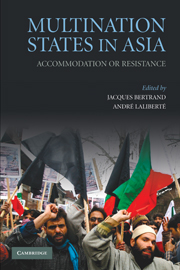Book contents
- Frontmatter
- Contents
- List of Tables and Figures
- List of Maps
- List of Contributors
- Acknowledgments
- Maps
- 1 Introduction
- 2 Revolutionary State Formation and the Unitary Republic of Indonesia
- 3 The Crisis of Border States in India
- 4 Pakistan: Neither State Nor Nation
- 5 Constitutional Politics and Crisis in Sri Lanka
- 6 The Dilemmas of Burma's Multinational Society
- 7 The Double-Edged Sword of Autonomy in Indonesia and the Philippines
- 8 China and the Virtual Taiwan Nation
- 9 The Failure of Ideologies in China's Relations with Tibetans
- 10 Leninism's Long Shadow in Central Asia
- 11 Conclusion
- References
- Index
7 - The Double-Edged Sword of Autonomy in Indonesia and the Philippines
Published online by Cambridge University Press: 05 June 2012
- Frontmatter
- Contents
- List of Tables and Figures
- List of Maps
- List of Contributors
- Acknowledgments
- Maps
- 1 Introduction
- 2 Revolutionary State Formation and the Unitary Republic of Indonesia
- 3 The Crisis of Border States in India
- 4 Pakistan: Neither State Nor Nation
- 5 Constitutional Politics and Crisis in Sri Lanka
- 6 The Dilemmas of Burma's Multinational Society
- 7 The Double-Edged Sword of Autonomy in Indonesia and the Philippines
- 8 China and the Virtual Taiwan Nation
- 9 The Failure of Ideologies in China's Relations with Tibetans
- 10 Leninism's Long Shadow in Central Asia
- 11 Conclusion
- References
- Index
Summary
Sub-state national groups usually seek some form of self-determination and recognition of their special status. Self-determination is sometimes expressed in calls for an independent state that would coincide with the territorial homeland of the nation. For the most part, however, such goals are unattainable. Instead, most groups settle for some form of autonomy or for federalism, where such structures already exist.
Autonomy allows the accommodation of ethno-nationalist demands by creating a new territorial unit with special powers, or by decentralizing additional powers to an existing territorial unit that corresponds to the group's homeland (Gurr 2000; Horowitz 1985). Asymmetrical federalism accomplishes the same goals. Groups not only obtain political control over their territorial homeland, but also, with their control of a sub-state government, they obtain the leverage to negotiate with the central government.
Autonomy also provides a territorially grounded recognition of national status, although this is mostly implicit. Many states are reluctant to formally recognize sub-state national groups as “nations.” The recent recognition of the Catalan nation by the Spanish state is a rare exception. Some states in Asia have recognized “multination” status but, as Laliberté and Thawnghmung have noted in the cases of China and Burma, they have, ironically, done so against a backdrop of strong centralizing tendencies and an actual denial of significant powers to accompany such recognition. This kind of recognition is typical of the Soviet-style model of recognition.
- Type
- Chapter
- Information
- Multination States in AsiaAccommodation or Resistance, pp. 164 - 195Publisher: Cambridge University PressPrint publication year: 2010
- 6
- Cited by



